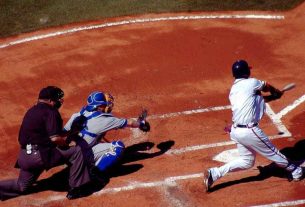In baseball, a home run comes when the ball leaves the pitcher’s hand and goes over the outfield fence. However, it is not until it makes contact with a player that any runs are scored. In this blog article, you’ll learn all about how fastballs come off the bats in different situations like swinging and walking.
The Importance Of Ball Exit Speed In Baseball
There is no doubt that ball exit speed is an important factor in baseball. There are many reasons for this, but the most basic is that it affects a player’s ability to hit a ball. Faster balls travel further and are more likely to be hit hard. On the other hand, slower balls are more likely to be hit softly and go out of the park.
This is why it’s so important for players to have good ball exit speed. It affects their batting average, home runs, and strikeouts. In fact, the best predictor of a player’s future success in baseball is his ball exit speed.
So if you’re looking to improve your skills as a ballplayer, make sure you focus on increasing your ball exit speed. You’ll see big results in both your batting average and your overall gameplay.
How Fast Does A Baseball Come Off The Bat
The fastest recorded ball exit speed in 2016 was 125.2 mph. This is just a hair above the average speed of a professional pitcher (98-100 mph).
But how does this compare to the speed of a batted baseball?
Well, let’s break it down:
The average MLB pitch is thrown at about 93 mph. That means that if you’re sitting in the stands for a game and watching a pitcher throw to home plate, you’re only going to have about one second from when he releases the ball until it lands on the catcher’s glove.
Now let’s think about what happens when a ball comes off the end of an aluminum bat at around 95 mph (which is fairly typical). The only thing that slows down your ball is air resistance. So you can imagine what would happen if you were able to cut out most of that air resistance by throwing it straight at your target!
Factors Affecting The Speed Of A Baseball
It can be difficult to determine exactly. Factors that affect this speed include the player’s strength, hand-eye coordination, and batting stance. Some experts believe that the average speed of a baseball is around 90 mph. But this number can vary depending on a variety of factors.
The pitcher can influence the speed at which a pitch is delivered. A faster pitch will accelerate more quickly than one that is slower than normal. This means that the batter must be able to judge the speed of the pitch correctly in order to hit it consistently and with good accuracy.
Another factor that can affect speed is the hand-eye coordination of a player when he receives a pitch. Some experts believe that batters who have better hand-eye coordination will hit the ball harder. Because they are able to judge and react to their pitches more quickly. Although this is also true for batters who have weaker hand-eye coordination. It should be noted that they may be better off by learning how to time their swings since timing determines whether or not a ball will be hit well or not.
However, One thing that is important to note, is that a player’s speed cannot help him determine how the ball will react if it was hit too hard. So this advice should not be taken as the only determining factor for a batter who knows he is hitting too softly. The reason is that some batters will not hit the ball well. Because of their swing speed, their swing may be too slow to keep up with a pitcher. If a battery has a slower swing than his speed, this could cause certain types of pitchers to be able to throw fastballs past them.
Ball Exit Speed By Age
The average ball exit speed from a baseball varies depending on the player’s age. Younger players have a higher exit speed than older players, and this trend continues as players get older.
The average ball exit speed for players in their early 20s is 92 mph, while players aged 30-39 have an average exit speed of 89 mph. The 40-49 age group has the slowest average ball exit speed at 85 mph.
Interestingly, the 50-59 age group has the highest average ball exit speed at 90 mph. This may be due to the fact that many of these players are still physically capable of generating a high exit speed.
The average exit speed for players in their 60s is not that far off from the average exit speed of younger players. The average ball exit speed for players in their 60s is 88 mph, while this number drops to 70 mph for those in their 60+.
How To Increase Ball Exit Speed?
If you want to increase the speed at which a baseball leaves the bat, there are a few things you can do. One of the simplest things is to increase your swing speed. Swinging faster will cause the bat to come off the ball quicker, and will result in a higher exit velocity. Additionally, you can use a stiffer bat and increase your contact point. These changes will cause the ball to leave the bat sooner, resulting in a higher exit velocity.
Although increasing your swing speed may be the most obvious solution, there are other factors that can affect speed as well. For example, if you have poor body control, your hips and shoulders will move too quickly, robbing you of power and speed. Improving your body control will therefore help you improve your speed as well.
Your arms and hands will also be more efficient as a result of this change. The problem with these suggestions is that you can’t really take them into consideration when you’re hitting. You have to hit a ball, evaluate its speed, and then try to adjust your bat accordingly.
Finale Thought
The speed of a baseball coming off the bat is incredibly difficult to predict. Many factors come into play, including the person’s hand-eye coordination, arm strength, and batted ball speed. However, one thing that almost always remains consistent is the pitcher’s velocity. For the most part, pitchers can throw their fastest pitch when they are around 90-92 mph. The only time this is not true would be in certain situations, such as when a pitcher is trying to show they are better than they are. In any event, the absolute hardest thing for a hitter to hit could be 90-92 mph fastballs.



